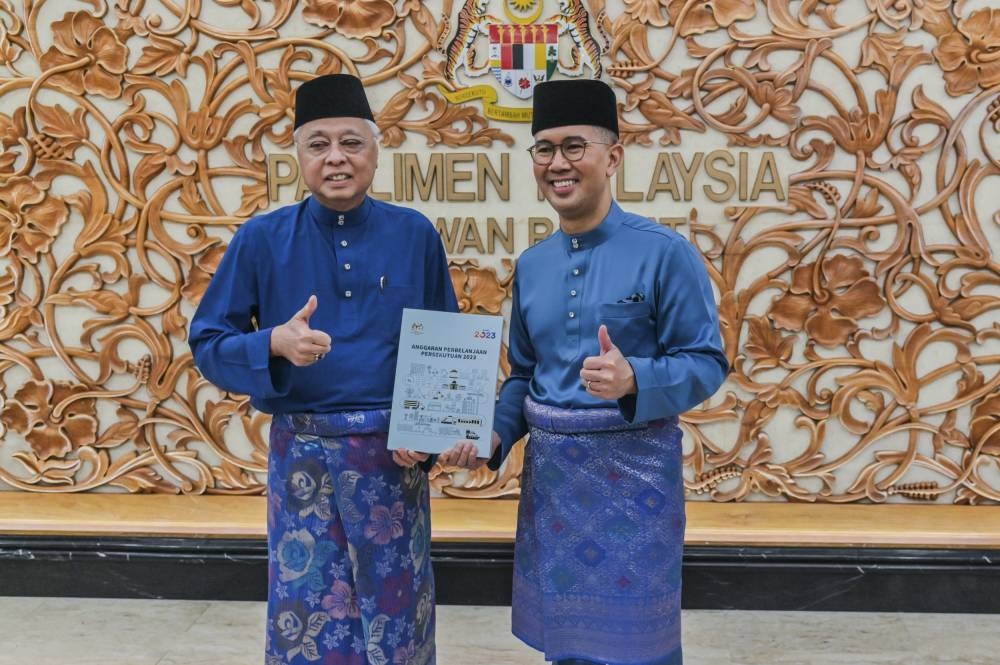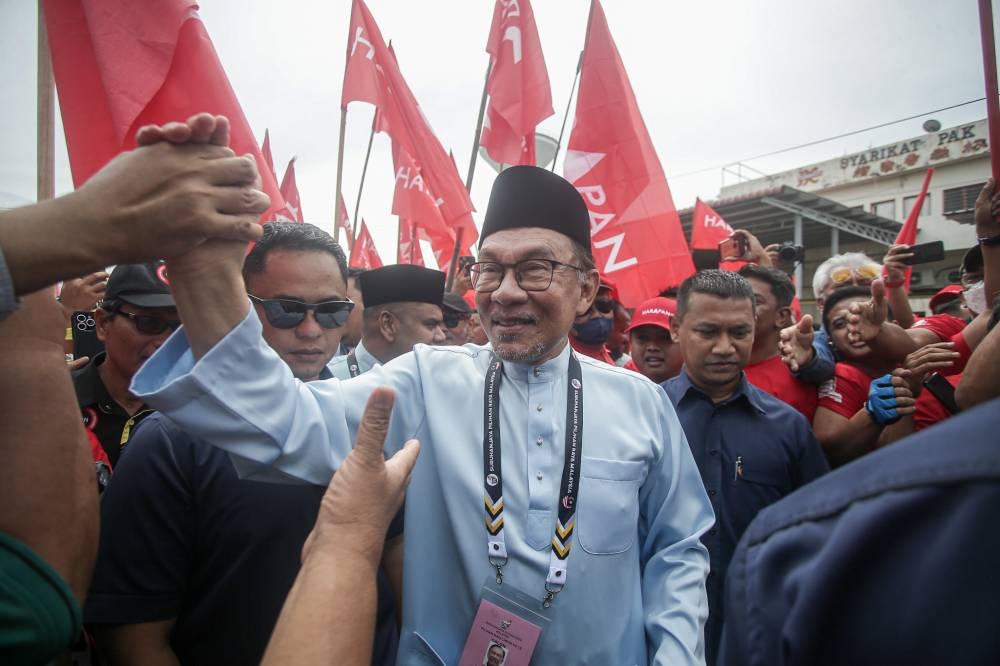KUALA LUMPUR, Nov 8 — Voting for Pakatan Harapan (PH) will truly be a vote for stability, unlike Barisan Nasional (BN), which may not even be able to give Malaysia the same Budget 2023 if a new government is formed with a new prime minister, said Fahmi Fadzil.
The PH communications director claimed in a recent interview that BN’s instability is reflected in uncertainty over who is its actual prime minister candidate, claiming that Malaysians could find themselves “receiving a different product than what was ordered” if they vote for BN.
Fahmi cast doubt over BN’s manifestos for elections and its ability to fulfill such promises, pointing out that BN did not carry out much of what it had promised in the 2013 election, and had in the past tabled a different government Budget for the year 2000 after elections took place.
In 1999, the BN government tabled Budget 2000 on October 29. Before the Budget 2000 could be passed, Parliament was dissolved on November 11 and the general election was held on November 29.
The new BN government that was formed then tabled an interim Budget in December 1999 to cater for the first few months of government spending in 2000, before finally tabling the full Budget 2000 in February 2000.
“Between the Budget that was announced before going into elections and the final Budget that was tabled, it was very different,“ he told Malay Mail.
“So even if BN were to go into elections with Budget 2023 as its manifesto, there is no assurance that they can give, that this is going to be exactly the Budget that they table again. Because when the Budget was put together, there were ideas from PAS, ideas from Bersatu and other parties and other ministers.
“When they have a new line-up of Cabinet members, when they have a new minister of finance, the emphasis could be very different. If they have a new prime minister and it’s not Ismail Sabri but Zahid Hamidi, his emphasis is going to be very different,“ he said.
Just like 1999, the 15th general election (GE15) was called before the Budget 2023 which was presented on October 7 could even be approved, as Parliament was dissolved on October 10.

Fahmi also chalked down BN’s instability to the lingering possibility of BN chairman and Umno president Datuk Seri Ahmad Zahid Hamidi still eyeing the prime minister post for himself, instead of letting Umno vice-president and caretaker prime minister Datuk Seri Ismail Sabri Yaakob fill the post again.
“At least with Pakatan Harapan, we have seen very clearly, our candidate for prime minister — very clear; who is also chairman of Pakatan Harapan, very clear; we have announced all our candidates, very clear; we have announced our manifesto,” he said.
“For BN, the poster boy and the prime minister might not be the same person, because the chairman of BN is not the prime minister. So on election night, say in theory, BN wins, it is not Ismail Sabri who will be summoned to the Istana, it will be Zahid Hamidi.
“And that’s why when [Singaporean broadcaster] CNA asked Zahid Hamidi will you put your own name in, he tried to brush it aside and said it’s an irrelevant question, which means he does intend to put his own name or at least you can’t exclude that possibility. He should have said ‘no, I will not put my own name’, that resolves a lot of the questions,” he said.
Fahmi highlighted that this means voting in BN candidates such as Khairy Jamaluddin and securing a victory for BN would ultimately result in Ahmad Zahid either becoming the prime minister or being a “puppet master” of the next prime minister.
“So a vote for Khairy will be a vote for Zahid Hamidi. Yes, it’s true, because some people say, oh, you know, Khairy is a nice guy, but look at his leader.
“And actually they talk about stability, even if BN were to win and they were to form a government, you will have two tigers on the mountain again if Zahid is not the prime minister, because he has shown he can kill off all of Ismail Sabri allies.
“Which means if Ismail Sabri really becomes a prime minister, he will be a lame duck prime minister, he will be a puppet prime minister, and the puppet master will be Zahid. Mark my words,” he said.

“Imagine, Ismail Sabri already told us that he does not intend to have elections now, yet he was pressured and pressured to have the elections now. So you will have a government that will be at the mercy of the whims and fancy of the chairman of BN, the president of Umno who is not the chief executive.
“If you want to see true stability, that is not rhetoric but is practised, it’s real, it’s happening now, is Pakatan Harapan. Anwar Ibrahim is the poster boy, Anwar Ibrahim is the chairman of Pakatan Harapan, he’s the one who signs the candidate appointment letters, and there is no dispute. You get what you voted for.
“Whereas for BN, people might vote in Johor, people might have voted thinking they are going to get Hasni as MB, suddenly they got Onn Hafiz, even though during the campaign, they went all around saying, Hasni, Hasni, poster boy, poster boy. So with BN, you order barang lain, yang sampai barang lain (order something, what is delivered is something else), how stable is that?” he said, referring to the Johor state election where Datuk Onn Hafiz Ghazi became mentri besar instead of the promised Datuk Seri Hasni Mohammad.
Fahmi also pointed out PH had governed Selangor and Penang for almost 14 years, and these two states have not seen any change of government midterm, saying that this is the “proof of stability brought by PH and Pakatan Rakyat before that”.
“If you have political stability, then all of your plans can be executed barring economic circumstances. If you don’t have political stability, you voted for something, but then you get something else. Silap silap, Undi BN, dapat GST,” he said, hinting add the possibility of the goods and services tax (GST) returning.
Ultimately, Fahmi presented it as PH being the better choice with true stability: “I think it’s like this lah, you can vote for corruption, you can vote for betrayal; or you can vote for hope. ‘Undi rasuah, undi katak or undi harapan’ (vote for corruption, vote for frogs or vote for hope), take a pick.”
Apart from being focused on the economy and helping Malaysians cope with the rising cost of living, PH’s 15th general election manifesto known as the “Harapan Action Plan” or “Tawaran Harapan” is also concerned about other key areas such as climate change and go hand in hand with promised reforms. Launched on November 2, PH was the first coalition to unveil its manifesto for GE15.
Reforms are necessary to avoid public funds from being wasted and to ensure more efficient usage, and ultimately revolve around stopping corruption and which would also be good for the economy, Fahmi explained.
“There was an Umno warlord who confessed, as a businessman, it was easier for him to do business under PH, compared to BN and Perikatan Nasional (PN). An Umno warlord confessing to me that there was very little corruption, that people did not dare to ask for bribes when Pakatan Harapan was in power, which meant as a businessman, you will be treated fairly, you know that there’s no queue-cutting, that it’s based on ability, not cable, you know,” he said.
“So that reform is to me, it’s about stopping corruption, but it helps the economy. When you take into consideration the fact that Bank Negara acknowledges the International Monetary Fund’s numbers that an estimated RM40 billion to RM60 billion is lost to corruption every year, leakages, so our reforms would directly address these leakages so that the rakyat’s ringgit is much more efficiently used,” he added.
Yesterday, Ahmad Zahid said that while Umno vice president and caretaker prime minister Datuk Seri Ismail Sabri Yaakob is still BN’s sole candidate for the prime minister post, the decision ultimately lies with the Yang di-Pertuan Agong.






















